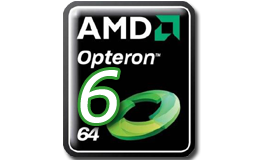AMD Releases 6-Core Istanbul Ahead of Schedule
AMD’s ‘Istanbul’ Opteron CPUs are now shipping ahead of schedule. AMD claims the processor will produce 34 percent more performance than the existing "Shanghai" quad-core processor at the same power requirements.
Originally, the 45-nm Istanbul had been scheduled to ship later in the year, but AMD president and CEO Dirk Meyer said that the company decided to "pull in" the timetable.
The six-core server processor integrates with two-, four- and eight-socket servers using AMD’s Direct Connect Architecture
AMD said that systems based on the six-core Opteron processors are expected to be available beginning this month from Cray, Dell, HP, IBM and Sun Microsystems. HE, SE and EE versions are planned for the second half of 2009.
AMD listed the following as key features of its latest Opteron:
- Six true cores
- HyperTransport Technology Assist (HT Assist)
- Increased HT3 bandwidth
- AMD-P power management technologies
- AMD Virtualization (AMD-V) technology
- Same power/thermal ranges as Quad-Core AMD Opteron processors
So, what’s next for the Opteron? Look out for 12 cores in 2010 and an even more impressive 16 cores by 2011.
Get Tom's Hardware's best news and in-depth reviews, straight to your inbox.
-
Tindytim ReplyAMD claims the processor will produce 34 percent more performance than the existing "Shanghai" quad-core processor
Adding 33.3% more cores increases the performance by 34%? WOW!
I'm seriously wondering if they didn't just pull that number out of their asses based on the number of cores, or if they did any extensive testing. -
ohim TindytimAdding 33.3% more cores increases the performance by 34%? WOW!I'm seriously wondering if they didn't just pull that number out of their asses based on the number of cores, or if they did any extensive testing.i wonder if you did some extensive search on their claims or you just pulled your comment out of your ass ?Reply -
apmyhr TindytimAdding 33.3% more cores increases the performance by 34%? WOW!I'm seriously wondering if they didn't just pull that number out of their asses based on the number of cores, or if they did any extensive testing.Very good point. Both are 45nm, so how can they add 2 cores and keep the same TDP while adding more than the theoretical possible of 33.3% performance?Reply -
Tindytim ohimi wonder if you did some extensive search on their claims or you just pulled your comment out of your ass ?What research? No one has their hands on this processor yet, other than AMD. And AMD hasn't gone into detail on how it achieved those numbers.Reply
I said "I wonder" because I have no idea, simply the fact that they got that percentage is what I find curious. The scaling in performance is rarely that large when adding cores. -
ohim wait and time will tell ;) maybe they left out the part where they changed a bit the core architecture, or against what they chose to compare performance since we all know the intel adds up to 85% more performance in multimedia(compared to what ??) buy intel now ... etc :) marketing stuff :)Reply -
armistitiu TindytimWhat research? No one has their hands on this processor yet, other than AMD. And AMD hasn't gone into detail on how it achieved those numbers.I said "I wonder" because I have no idea, simply the fact that they got that percentage is what I find curious. The scaling in performance is rarely that large when adding cores.How about we all learn some math before we post. 2 more cores mean 50% more cores right?(50% * 4 =2) So the theoretical maximum performance gain is 50%.Reply
It's 34% because not all applications use 6 threads. -
mirkos Having a 4 core processor and udgrade it to 6-core is a 50% upgrade not 33%. So we have a boost of 50% more cores and 34% boost in performance. Correct me if I'' wrong! Nevertheless it seems to be a very good product that will press more the cost for the 4 core processorReply -
ohim armistitiuHow about we all learn some math before we post. 2 more cores mean 50% more cores right?(50% * 4 =2) So the theoretical maximum performance gain is 50%.It's 34% because not all applications use 6 threads.4 cores out of 6 means 66.6% so the 6 core CPU has 33.4% more power :)Reply -
TheMan1214 armistitiuHow about we all learn some math before we post. 2 more cores mean 50% more cores right?(50% * 4 =2) So the theoretical maximum performance gain is 50%.It's 34% because not all applications use 6 threads.Reply
-
apmyhr armistitiuHow about we all learn some math before we post. 2 more cores mean 50% more cores right?(50% * 4 =2) So the theoretical maximum performance gain is 50%.It's 34% because not all applications use 6 threads.Crap, your right. Thanks for making us feel dumb.Reply

